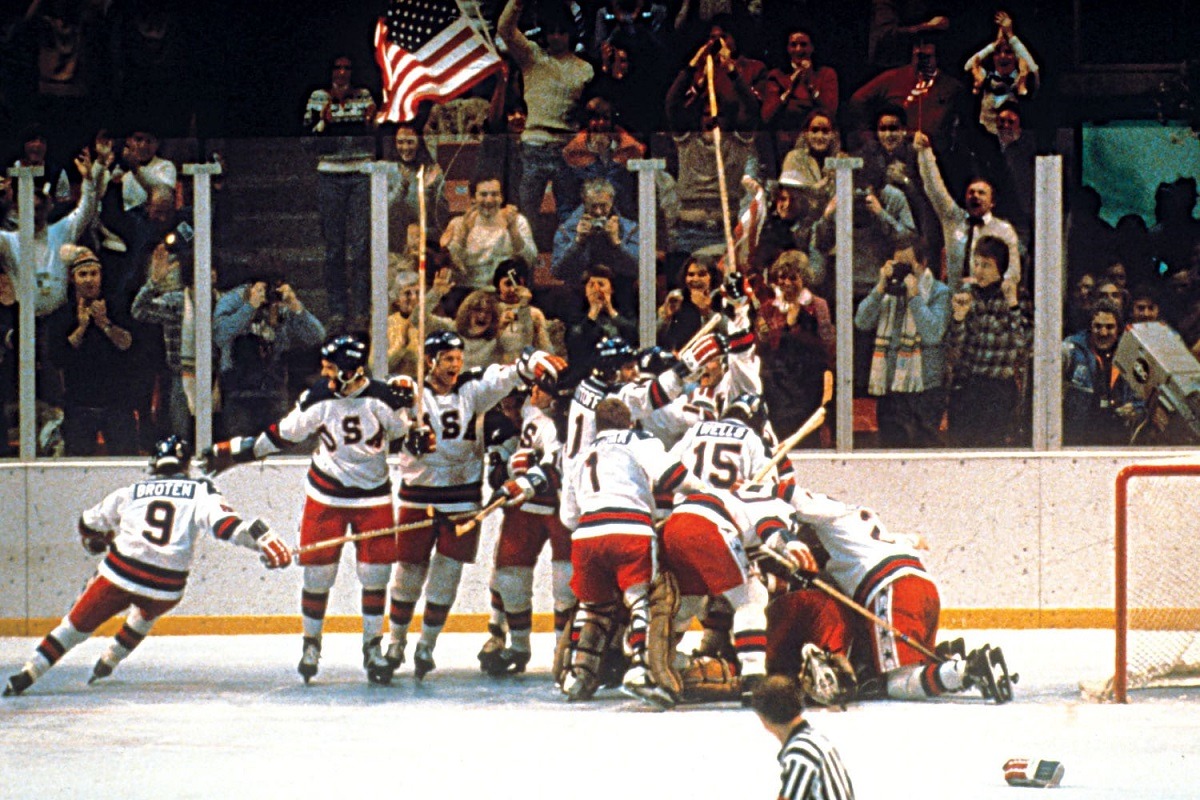Forty years ago today, the “Miracle on Ice” occurred when team USA upset the mighty Soviet Union (USSR) 4-3 in the medal round of the 1980 Winter Olympics in Lake Placid, New York. The Americans rallied from behind to defeat the best hockey team in the world at the time. Team USA defeating Russia at the 1980 Olympics is often considered the greatest upset in all sports.

Team captain, Mike Eruzione, scored a goal with 10 minutes remaining in the third period to put USA ahead, 4-3. Goalie Jim Craig shut down the Soviets the rest of the game, and USA held on to the seemingly impossible come-from-behind victory.
Only 13 days before, the Soviet Union crushed the young Americans in an exhibition game at Madison Square Garden in New York City. Team USA was embarrassed by the Soviets 10-3.
The blowout victory before the Olympics attributed to the Soviets’ overconfidence heading into the medal round at Lake Placid. USSR dominated the group stage and seemed like a lock for the gold medal until Russia met the US team on February 22, 1980.
The Red Army Machine had been playing together for a decade or longer. All of the USSR hockey players were members of the Army, and had 25-year contracts with the national team.
The USSR hockey team destroyed every team in their path, including a team of NHL All-Stars at Madison Square Garden in the autumn of 1979.
College Kids vs. Red Army Team
During the height of the Cold War, the America vs Russia hockey game had plenty of political repercussions for both sides.
The Americans previously won their only gold medal in hockey at the 1960 Winter Olympics in Squaw Valley, California. Between 1963 and 1979, the Soviet Union won every gold medal at the Olympics (1964, 1968, 1972, 1976), and won 14 World Championships. The Soviet Union would regain their Olympic prominence by winning the gold medal at the 1984 Olympics, and win again at the 1988 Olympics.
Herb Brooks coached Team USA. He won three NCAA championships at the University of Minnesota. He hand-picked the 1980 Olympic team, much to the dismay of the American hockey federation.
“I wasn’t looking for the best players,” said Brooks. “I was looking for the right players.”
Brooks wanted specific players that he knew could play a Russian style of hockey instead of the traditional and rougher North American style. The majority of players were from either Brooks’ own Minnesota Gophers squad or Boston University, with a handful of other schools represented.
The inexperienced Americans had less than nine months to prepare for the Winter Olympics. It was a difficult road, but the players coalesced into a team that had one mission: defeat the Soviets.
Brooks gave the Americans an uplifting speech before the USSR game that helped propel his team to the come-from-behind victory.
“If we played them 10 times, they might win nine,” said Brooks. “But not this game. Not tonight. Tonight, we are the greatest hockey team in the world. You were born to be hockey players. You were meant to be here tonight. This is your time. Now, go out there and take it.”
Miracle on Ice
If you ask any random stranger, they might get the specifics of the USA/USSR game wrong. Many people think the Americans defeated the Soviets in the gold medal game, which is factually incorrect. At the 1980 Olympics, they played a round-robin to determine the medals. USA met the Russia in round-robin play, and officially won the gold medal after they defeated Finland in the next game.
The epic moment when USA defeated Russia 4-3 at Lake Placid in the 1980 Olympics was immortalized in multiple documentaries and a big-budget Hollywood film.
A made-for-TV film appeared on ABC in 1981 starring Karl Malden as head coach Herb Brooks, and Steve Guttenberg as goalie Jim Craig.
In 2004, Disney produced “Miracle” with Kurt Russell in the feature role as coach Brooks.
In 2001, HBO released a documentary titled “Do You Believe in Miracles?” about USA beating Russia.
In 2015, ESPN released a 30 for 30 documentary titled “Of Miracles And Men,” which covers the USA/USSR game from the losing perspective of the Russians.
Do You Believe in Miracles?
Al Michaels was a relatively unknown sports announcer for ABC in 1980. He became famous overnight for his play-by-play of the 1980 USA/USSR game. Michaels won “Sportscaster of the Year” for his finishing call. His “miracles” tagline immortalized itself in both American and sports history.
“Do you believe in miracles? Yes!” blurted out Michaels as the final seconds ticked away on the game clock as the Americans locked up the impossible victory over the USSR.
These days, Michaels is best known as a football announcer. He calls Sunday Night Football on NBC after announcing Monday Night Football for two decades on ABC.












I was the with my young son and wife. Unforgettable.